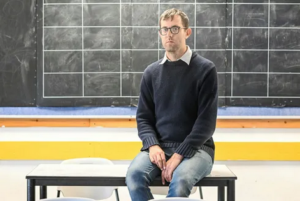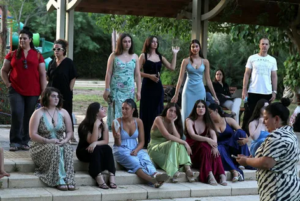My high school graduates are facing the bleakest future Israel has ever known

Shahar Regev in his classroom in Mikhmoret, Israel in 2023
Shahar Regev writes in Haaretz on 26 June 2024:
I’m a high school civics teacher in central Israel and last week I watched my twelfth-grade students graduate. The setting was idyllic for a send-off: a lawn of green grass next to a shimmering Mediterranean Sea on the grounds of our school, about an hour north of Tel Aviv. A breeze picked up as the hot June sun began to set. The backdrop of the war in Gaza, our hostages who are still there permeated the speeches, but so did proud talk of the students’ accomplishments and goals.
I looked at them, their eyes shining in the way 18-year-olds eyes shine with hope and enthusiasm imagining their future. I wanted to be happy for them, as I offered my congratulations, said goodbye with hugs and promises to be there for them. But inside I felt my heart shattering. What kind of life are we sending them into? Will it even be possible to have a good life here?
These are entirely new thoughts for me. I find them jarring, unwelcome, horrifying. And yet, this is what I fear, this is what I feel. And it’s so very different than how I felt last year when the previous year’s seniors were graduating, the pro-democracy protest movement at its height, battling the government’s plan to destroy the judiciary. Then I felt like the tools I helped equip the student with like critical thinking and political organizing would be enough to triumph. But now?
At my own high school graduation ceremony 23 years ago I remember the way my homeroom teacher looked at me. He was a man in his 50s, who lived through three wars, waves of terror attacks, political and social turbulence. His penetrating gaze told me: “I did my best for you! It’s your turn now. Make sure to do all you can, to take care of this country, we don’t have another.”
I looked up to him, wanted to live up to his faith in me. So after graduation I volunteered for a year of community work, and then enlisted in the Navy serving for eight years as a combat officer at sea and a ship’s commander in which I fought two wars myself.
The same sense national duty and purpose led me to join the program, Teach for Israel, that trained me to be an educator. Throughout my adult life, I’ve maintained that Israeli citizenship is both a great privilege and a great responsibility.
Today as a civics teacher, a “citizenship educator” as I call it, I’m proud to teach teenagers the language of civics, to open their minds abstract concepts, to provide tools to express their opinions in a civil manner, of how to take action in public and political arenas.
I believe these skills will allow them to help make an impact in the world, so they themselves can become influential citizens of Israel. In my class, students go beyond rote learning. They experience and practice social action within the classroom, the school, and the community. They learn to think critically, find and implement solutions. They learn how to approach elected officials, how to ask questions of them, and lobby them.

Graduating 12th-graders gather for prom in southern Israel. June 2024
I have been teaching civics for 11 years, and every time my graduates visit their school in army uniform, my heart swells with pride. I keep in touch with them, and hear about what social justice actions they are involved in.
But in the past year and a half I have felt the ground shake under my feet, leaving me terrified. I know I must continue my life’s work and educate the best citizens I know. On the other hand, I feel as if I’m lying to my students.
I am lying about their ability to make changes in our reality, about their prospect of living safely in Israel. In the last two years, my students have experienced first-hand the beginning of possible civil war. They saw the prime minister on trial for corruption, tires burning on the roads, rising police violence. My students have heard elected officials use malicious, offensive and false language. While we learned about the institutions comprising a democratic state, they saw the government dismantling those same institutions.
But throughout this time, they have also seen me and other teacher colleagues battling for their future through The Education Struggle, a movement of educators fighting for democracy in Israel. We have been demonstrating in the streets, been vocal in the media, and more. In the current increasingly repressive political climate I took a major personal risk joining this movement, but hoped it would be another lesson I teach my students, the future citizens.
Then came October 7.
This horrific attack and devastating war in Gaza that has followed reveal the delicate underbelly of the State of Israel: A crisis of trust. It began with the state’s dysfunction that day and its efforts to evade responsibility. Trust in the state is the basis of what I teach: the central motivation of what I plant in the hearts of teenagers about to be drafted into army service.
But what about the trust in the alarm sounded by army lookouts warning of a possible Hamas operation? My classes discuss how essential gender equality is and then we discover that men silenced the young, female, lookouts, costing so many lives?
I teach my students to trust that Israeli army will protect them. But one of my graduates was slaughtered at the Nova party, among hundreds of others. How can I ask them to see the army as omnipotent, and then see how it had to solicit equipment donations for soldiers? How can I ask them to see the army as omnipresent, while welcoming a new student evacuated from the north of Israel, possibly for good.
I will never forget hearing the story of a graduate of mine, who at 18, just six months into his service, told me he witnessed Hamas terrorists enter his base where they killed all but seven of 25 of his fellow fighters. He survived and made his way to his parents’ home, still covered in blood. How will I convince his peers that the army will prepare them to protect themselves and their country?
As an educator, I’ve always said I don’t have the privilege of losing my sense of optimism. We must always convey to our students that their actions can make a difference, that they can help make a better world.
But we live in a reality where the education minister actively promotes agendas that will foster ignorance, increase the circle of polarization, hatred and bloodshed. A minister of education who allows racist and homophobic agendas to enter schools.
I know that I did my best to equip my graduate with every Zionist and democratic tool in my toolbox. I know they are motivated to take action, to contribute to civil society, to the country.
But still, my body trembles. I am a tornado of emotions. As I said my goodbyes to the graduating 12th-graders last week I wonder if they saw the look of apology, anxiety and fear on my face, much as I tried to mask it as I watched them take their first steps into adulthood, into the bleakest, most uncertain future our country has ever known.
Shahar Regev teaches civics at a high school in central Israel. He’s one of the leaders of “The Education Struggle,” a movement of pro-democracy teachers.
This article is reproduced in its entirety
